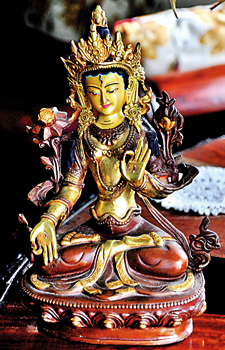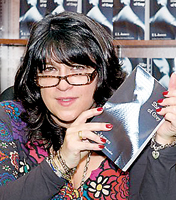Writing under the gaze of her Saraswati
Bowing before Saraswati for a few minutes at the start of every school term, Hindu schoolchildren in India pray for her blessing on their books and their efforts. Lankan writer Yasmine Gooneratne asks much the same of the goddess, though in her case, she is actually writing the books themselves.

Benign influence: The Tara figurine
“There was a point in my writing career when I was working from a Sinhala classical poem and I found again something I had known before about Indian writing, that when authors begin on any kind of creative work they make an invocation to the goddess of intelligence and creativity,” she says. “This idea appealed to me very much. I thought it was a good idea to invoke some deity who was interested in one’s work.”
When Saraswati did come into Yasmine’s life, however, she took the form of the goddess Tara. When The Samvad India Foundation singled out Yasmine for the Raja Rao award in 2002, they made her a gift of the beautiful little figurine. This international prize celebrates writers and scholars who have made an outstanding contribution to the literature of the South Asian diaspora, and the honour delighted Yasmine even as it took her by surprise.
“I never expected that the Indian writing establishment would regard me in that light,” she says. Today, she has placed the statuette – which she considers her Saraswati – in a recess where it overlooks her writing desk. “It’s in my study, where it keeps an eye on me,” she explains, emphasising that while she is not superstitious, like many other writers she likes the idea that “somebody up there has an eye on me and cares about what I’m writing.” It seems only sensible to lay claim to divine assistance when earthly readers may not be always very reliable.
With the goddess looking on, Yasmine has been hard at work on a new book. She’s experimented with different approaches to it – initially setting herself the task of writing things as they happened, she began at the end of the war only to find herself disillusioned with succeeding events. She was forced to rethink the whole idea and the book is now set a little further back in time, when the conflict’s outcome was still uncertain. That her plot refused to cooperate with her initial plans does not surprise her. A book is, after all, a slippery, fickle beast and drafts tend to flout their author’s intentions with impunity. “You have to keep yourself open to possibilities,” says Yasmine philosophically.
Typically, she will begin in a quiet way by writing a short story which she then expands, spending the months that follow painstakingly writing and redrafting, then editing and polishing until she’s fully satisfied. “I want to have it perfect, as perfect as possible,” she says. “Every book has taken me five years. Not very many people are willing to spend so much time on a single book.”
Though she has simultaneously juggled many other commitments, her book has never been very far from her thoughts. “I was interested when I read that Jane Austen had the same feeling.

Yasmine ¦
She said, ‘I cannot forget this book, it is like nursing a child,’” she says. Currently, Yasmine’s newest manuscript is with her most trusted readers: “My husband has read it, my son has read it and my daughter is reading it – how long she’ll take I don’t know – but I certainly won’t go into print until I have all their opinions.”
To edit it, she knows she will have to have the steely resolve of Lady Macbeth – “it’s like murdering your child,” she says anticipating the many sections that she will simply have to delete to make it ready for publication. However, at the end of the process, and by Saraswati’s grace, she will have a book to be proud of.
comments powered by Disqus






















